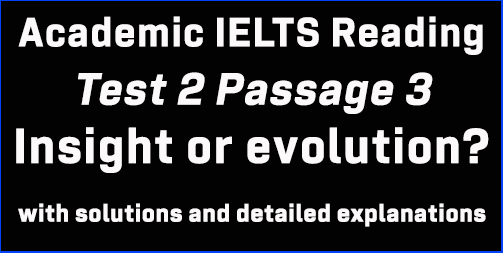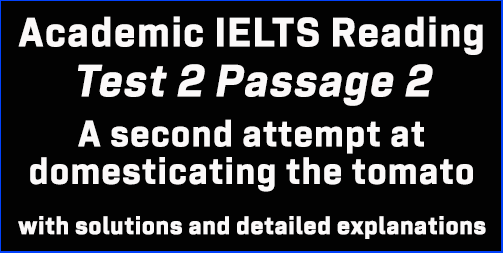IELTS Academic Reading: Cambridge 14, Reading Test 3: Passage 1; The concept of intelligence; with top solutions and detailed explanations
This IELTS Reading post focuses on all the solutions for IELTS Cambridge 14 Reading Test 3 Passage 1 which is entitled ‘The concept of intelligence’. This is an aimed post for candidates who have major problems in finding Reading Answers. This post can guide you the best to comprehend every Reading answer without much difficulty. Tracing IELTS Reading answers is a slow process and I hope this post can help you in your IELTS Reading preparation.

IELTS Cambridge 14 Test 3: AC Reading Module
Reading Passage 1:
The headline of the passage: The concept of intelligence
Questions 1-3: IDENTIFYING INFORMATION
[This question asks you to find information from the passage and write the number of the paragraph (A, B, C or D … .. ) in the answer sheet. Now, if the question is given in the very first part of the question set, I’d request you not to answer them. It’s mainly because this question will not follow any sequence, and so it will surely kill your time. Rather, you should answer all the other questions first. For this passage, first answer question 4- 13. After finishing with these questions, come to question 1-3. And just like List of Headings, only read the first two lines or last two lines of the expected paragraph initially. If you find the answers, you need not read the middle part. If you don’t find answers yet, you can skim the middle part of the paragraph. Keywords will be a useful matter here.]
Question 1: information about how non-scientists’ assumptions about intelligence influence their behaviour towards others
Keywords for the question: non-scientist’s assumptions, intelligence, influence, behaviour towards others,
The answer is in paragraph B where the writer gives reference to the assumptions (theories) of non-scientists such as parents, people in job interviews and other general people. Let’s take a look at lines 4-7, “For example, parent’s implicit theories of their children’s language development will determine at what ages they will be willing to make various corrections in their children’s speech. More generally, parents’ implicit theories of intelligence will determine at what ages they believe their children are ready to perform various cognitive tasks.”
Here, behaviour with others is a kind of cognitive task.
So, the answer is: B
Question 2: a reference to lack of clarity over the definition of intelligence
Keywords for the question: lack of clarity, definition of intelligence,
The first of paragraph A has the answer for this question. Take a close look. “. .. . no one knows what it actually is. This chapter addresses how people conceptualize intelligence, whatever it may actually be.”
Here, the lines suggest that our idea about the definition of intelligence will be clear reading this chapter.
So, the answer is: A
Question 3: the point that a researcher’s implicit and explicit theories may be very different
Keywords for the question: researcher’s, implicit, explicit, theories, may be, different,
The first lines of paragraph D indicate the answer. Here, the author states, “…implicit theories can be useful when an investigator suspects that existing explicit theories are wrong or misleading.” This means implicit theories may be right when explicit theories are wrong.
So, the answer is: D
Questions 4-6: In this type of question, candidates are asked to find out whether:
The statement in the question matches the claims of the writer – YES
The statement in the question contradicts the claims of the writer – NO
It is impossible to say what the writer thinks about this – NOT GIVEN
[For this type of question, you can divide each statement into three independent pieces and make your way through with the answer.]
Question 4: Slow language development in children is likely to prove disappointing to their parents.
Keywords for the question: slow language development, likely to prove, disappointing,
We find the reference of ‘language development in children’ in paragraph B; but there is no mention of any slow or fast language learning.
So, the answer is: NOT GIVEN
Question 5: People’s expectations of what children should gain from education are universal.
Keywords for the question: expectations, what children should gain, education, universal
The answer lies in paragraph E. Take a look at lines 2-6, “. … . .people have expectations for intellectual performances that differ for children of different ages. How these expectations differ is part a function of culture. For example, expectations for children who participate in Western-style schooling are almost certain to be different from those for children who do not participate in such schooling.” Here, these lines indicate that expectations of what children should achieve, learn or gain for education are not universal; it differs for their age and the culture in which they are brought up.”
So, the answer is: NO
Question 6: Scholars may discuss theories without fully understanding each other.
Keywords for the question: scholars, may discuss, without, understanding,
The answer is in the last lines of paragraph J. In lines 4-6 the author says, “. .. … .Until scholars are able to discuss their implicit theories and thus their assumptions, they are likely to miss the point of what others are saying when discussing their explicit theories and their data.” So, it is noted here that scholars may consult with each other about the theories sometimes without fully understanding each other’s point.
So, the answer is: YES
Questions 7-13: (Matching statements with correct theory):
(The rules for finding answers to this sort of question are simple. Just find the keywords and read around different names of people or person (theory) carefully. Then, give a quick look to check whether there is another statement or idea provided by the same person in the text. If there is, check the reference carefully and decide your answer. Remember, the questions may not follow any sequential order. )
Question 7: It is desirable for the same possibilities to be open to everyone.
Keywords for the question: desirable, same possibilities, open to everyone,
The answer in found in Section H, in the very opening line, “The Jeffersonian view is that people should have equal opportunities, …. ….”
Here, people should have = desirable, equal opportunities = same opportunities,
So, the answer is: B (Jeffersonian)
Question 8: No section of society should have preferential treatment at the expense of another.
Keywords for the question: no section, preferential treatment, expense of another,
The last line of Section I has the answer. The author writes, “. .. In this view, we do not need or want any institutions that might lead to favouring one group over another.”
Here, favouring one group over another = preferential treatment at the expense of another
So, the answer is: C (Jacksonian)
Question 9: People should only gain benefits on the basis of what they actually achieve.
Keywords for the question: should, gain benefits, what they actually achieve,
The answer is found at the end of section H. Take a look at this line, “. .. . . .to allow children the opportunities to make full use of the skills they have.”
Here, allow children the opportunities = people should only gain benefits, skills they have = what they actually achieve,
So, the answer is: B (Jeffersonian)
Question 10: Variation in intelligence begins at birth.
Keywords for the question: variation, intelligence, begins, birth,
The answer can be traced in section G, in the very beginning. The writer says, “ . . .people are born with different levels of intelligence . .. . .”
Here, different levels = variation
So, the answer is: A (Hamiltonian)
Question 11: The more intelligent people should be in positions of power.
Keywords for the question: more intelligent people, positions of power,
The answer for this question is found in lines 4-7 of Section G, “.. . seem to have shared this belief when they wrote about the emergence of a cognitive (high-IQ) elite, which eventually would have to take responsibility for the largely irresponsible masses of non-elite (low IQ) people who cannot take care of themselves.”
Here, cognitive (high-IQ) elite = more intelligent people, eventually would have to take responsibility = should be in positions of power
So, the answer is: A (Hamiltonian)
Question 12: Everyone can develop the same abilities.
Keywords for the question: everybody, develop, same abilities,
The answer can be traced in the middle of Section I. “… . . people are essentially intersubstitutable except for specialized skills, all of which can be learned.”
So, the answer is: C (Jacksonian)
Question 13: People of low intelligence are likely to lead uncontrolled lives.
Keywords for the question: low intelligence, likely to, lead, uncontrolled lives,
The last few lines of Section G give us the answer. First the writer says in lines 6-7, “ . . .for the largely irresponsible masses of non-elite (low-IQ) people who cannot take care of themselves.”
Then in the last lines the author mentions, “.. .Left to themselves, the unintelligent would create, as they always have created, a kind of chaos.”
Here, chaos means disorder which is the result of irresponsible people’s lifestyle.
So, the answer is: A (Hamiltonian)
Click here for solutions to Cambridge 14 Test 3 Reading Passage 2
Click here for solutions to Cambridge 14 Test 3 Reading passage 3




I think the explanation for question 9 should be the third and fourth line of Paragraph H: “People are awarded for what they accomplish, if given equal opportunity. Low achievers are not rewarded to the same extent as high achievers.”
1. awarded = gain benefits
2. achieve = accomplish
this the same did to get answer